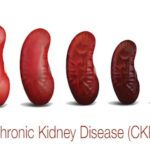Photo Caption: The DKMS Clinical Trials Unit was founded in 2013 by the stem cell donor center DKMS. Its goal is to advance medical and scientific progress in the field of blood cancer therapy in order to continuously improve the survival and healing chances of blood cancer patients. From left to right: Prof. Dr. Johannes Schetelig, Head of the DKMS Clinical Trials Unit (CTU) and Head of the Stem Cell Transplantation Unit at the University Hospital Carl Gustav Carus Dresden; Sarah Trost, Team Leader Clinical Trials of the CTU.© Tobias Ebert for DKMS
- First DKMS clinical trial has practice changing results for patients with acute myeloid leukemia (AML)
- Blood cancer patients worldwide could soon benefit from the results.
India
healthysoch
New Delhi, December 15, 2022 :

In acute myeloid leukemia (AML), standard of care is to attempt a complete remission before stem cell transplantation. Complete remission means that the disease is no longer detectable by available diagnostic measures. This imperative is now being challenged by the results of the first ever completed clinical trial facilitated and organized by DKMS. The results of this trial suggest that adult patients that are dealing with relapse or refractory AML should receive stem cell transplantation as soon as possible.
Contrary to earlier assumptions, achieving complete remission prior to transplantation does not increase the overall chances for life but even unnecessarily prolongs chemotherapy, associated side effects, and hospitalization. This important conclusion was reached by the researchers at the University Hospital Carl Gustav Carus Dresden and at the National Center for Tumor Diseases Dresden (NCT/UCC). Prof. Dr. Schetelig, Head of the Department of Stem Cell Transplantation at the University Hospital Dresden (Germany) and Head of the DKMS Clinical Trials Unit, presented the results on December 11 at the world’s largest hematology congress – the annual meeting of the American Society of Hematology (ASH) – in New Orleans, USA. The study was supported by the Study Alliance Leukemia (SAL), the Cooperative German Transplant Study Group and Münster University Hospital.
Adult patients with poorly responding, non-favorable AML after initial induction therapy or those who have already relapsed are usually advised to undergo allogeneic stem cell transplantation – as a chance for long-term cure. An important step prior to this life-saving therapy has always been to bring the patient back into complete remission by high-dose chemotherapy.
The clinical trial compared the standard treatment with an alternative approach for high-risk AML patients
The goal of the randomized controlled trial led by Prof. Schetelig was to get patients to transplantation as soon as possible. This coined the name of this trial: ASAP. The team of researchers collected data from 281 patients with a median age of 61 years who were divided into two groups. According to standard practice, group one was treated with prolonged chemotherapy before stem cell transplantation to achieve complete remission. Group two received a transplant after only a short 12-day conditioning period without the intention of achieving complete remission prior to transplantation. A prerequisite for stem cell transplantation was, of course, the availability of a matched allogeneic donor.
The results of the trial are surprisingly clear
The common practice of achieving complete remission before transplantation shows no advantage in terms of overall success or overall survival. Moreover, patients in the alternative study arm not only achieved the same outcome – they also benefited from fewer side effects by not having to undergo lengthy high-dose chemotherapy and their median hospital stay was only half as long. “The results of our clinical trial challenge the international standard of leukemia therapy and were also surprising for us. They suggest that if an HLA-compatible stem cell donor is available, transplantation should take place as soon as possible, even if leukemia cells are still detectable in the patient’s body,” says Prof. Schetelig. “Moreover, these results underscore the need for early initiation of donor search, possibly at the time of diagnosis but at the latest after receipt of genetic reports which show a non-favorable risk profile for AML.”
The implementation of the results in the clinic may benefit patients worldwide
Even with intensive chemotherapy, the previously targeted complete remission can only be achieved in about 50 percent of patients. If the corresponding treatment is unsuccessful, most patients have so far received a second intensive chemotherapy with correspondingly burdensome side effects, depending on their overall state of health. Immediate transplantation without a prior attempt at complete remission could not only reduce side effects and shorten hospital stays, but also allow more patients access to this potentially life-saving therapy. “This is especially true for countries with less comprehensive healthcare, where stem cell transplantation is often not performed after a failed complete remission, also for cost reasons. Eliminating this expensive intermediate step could therefore open up the possibility of stem cell transplantation to more AML patients worldwide, which in many cases is the only chance of a cure,” explains Prof. Schetelig.
DKMS enables clinical research
“Normally, sponsors of clinical research pursue economic interests. It is unusual to conduct a clinical trial that questions the use of a standard medical intervention – usually it is the other way around. That’s why it’s necessary for nonprofit organizations like DKMS to also conduct clinical research. This way, we can ensure that patients receive the best possible treatment and that we actually advance patient care,” says Dr. Alexander Schmidt, Global Chief Medical Officer at DKMS.
healthysoch







